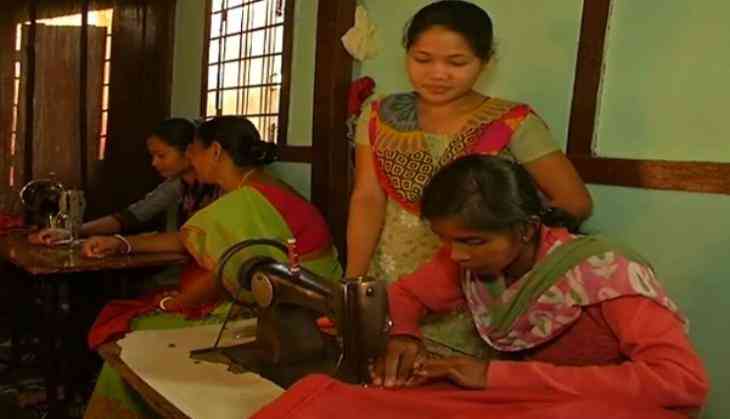
Tribal communities in Tripura have for long practiced jhum or shifting cultivation, a traditional method where forests are slashed and burnt to create land for agriculture.
Though the practice doesn't yield much income to farmers, hence to help create alternate source of income, farmers are being provided vocational training under the Indo-German Development Cooperation Project.
Jhum or shifting cultivation is an indigenous way of agriculture practice where the tribal farmers use the same land for a number of vegetation one after the other.
This technique is mainly followed by the hilly tribes who don't possess much of plain lands for extensive farming.
Over the years the tribal farmers of the state of Tripura has been involved in vigorous jhum or shifting cultivation where the farmers undergoes difficult time as they shifts to another virgin piece of land for cultivation.
The process involves slashing and burning the plants which is environmentally destructive and faulty land of practice causing damage to soil system.
Jhum cultivation has led to the exploitation of jhumias as there is no permanency in cultivation and yields very lesser income to them which in turned become difficult for them to sustain life.
"Before joining the project I use to do jhum cultivation but now I have shifted from Jhum cultivation and I do permanent cultivation of banana, bettle nuts, orange to name a few and it is yielding good crops. There is immense hard work in jhum cultivation as we need to slash down trees and burn them which are hazardous to environment so I have left it," said Jal Thangora, Benificiary.
Realising the plight of these poor farmers the Tripura Government is making all their efforts to shift the Jhumias to permanent cultivators or mainstream professions.
The Indo-German Development Cooperation Project was incepted in 2009 with the objective of improving the socio-economic status of the forest dwelling communities, especially the Shifting Cultivators, living in Dhalai and North Tripura districts covering about 28,000 Schedule Tribe, Schedule Cast and other backward class households.
The Project is a bilateral cooperation between the Federal Republic of Germany and Government of Tripura.
Recently, a national experience sharing workshop was held to felicitate the former jhum farmers who have been rehabilitated under IGDC project in Tripura.
Around 1200 ex-jhum farmers took part in the workshop who got permanently settled after undergoing vocational training on agri-horti-forestry model plantation, Fishery, Nursery, Broom making, Mushroom, Grocery Shops etc. thus diverting them away from their erstwhile shifting cultivation.
"Earlier I was a Jhoom cultivator, then I left that job and came here. These people gave me my garden and I was given areca nut, mangoes, papaya and I got a good space to work. There were problems in the jhooming cultivation process, but when I left it, I was able to manage this process," said another beneficiary Bisnu Ram Riyang.
Over 7000 tribal jhumia families have shifted to various professions by undergoing vocational training courses like beautician.
Moreover, till now 4000 tribal youths got self employed after vocational training.
"I study in class 11 in Salema higher secondary school and my father is a cultivator and I have come here to obtain vocational training on beautician which I am continuing along with my studies under Indo German project. I think in today's time it is hard to get jobs even after studies so I am here to learn beautician. In future at least this would help me to earn income and be self dependent," said a trainee.
In this way the IGDC project started capacity development and training programs on participatory planning at village level and eventually shifted its focus towards capacity development of villagers through formation of self-help groups and training them on its objective, functionaries and financial management.
It is worth mentioning that in the year 2006 the number of shifting cultivator families in the state stood at 27,477 but in the year 2016 this has come down to 8,168.
-ANI


